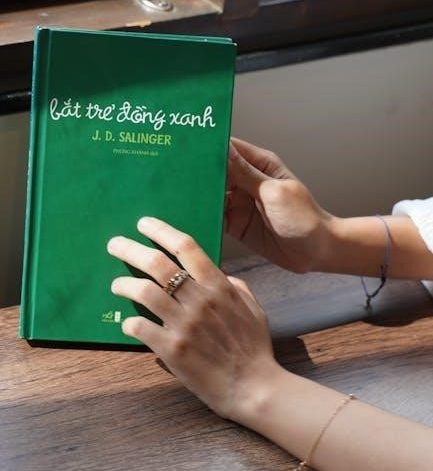Set during World War II‚ Markus Zusak’s The Book Thief follows Liesel Meminger’s journey of discovery through words․ Narrated by Death‚ it explores themes of literature’s power and human resilience during Nazi Germany․ The novel has gained global acclaim for its unique narrative style and emotional depth‚ making it a significant work in historical fiction․ Its PDF version is widely available online for readers worldwide․
Overview of the Novel
Set in Nazi Germany during World War II‚ The Book Thief by Markus Zusak narrates the story of Liesel Meminger‚ a young girl who discovers the power of words and literature․ After finding a mysterious book at her brother’s gravesite‚ Liesel begins stealing books to escape the harsh realities of war․ With the help of her foster father Hans and a Jewish fugitive Max‚ Liesel’s love for reading grows‚ offering hope and resilience amidst the chaos․ The novel‚ narrated uniquely by Death‚ explores themes of humanity‚ loss‚ and the enduring impact of literature․
Importance of the Book in Historical Fiction
The Book Thief holds a significant place in historical fiction for its unique portrayal of life under Nazi rule․ Through Liesel’s story‚ Markus Zusak highlights the power of literature as a form of resistance and survival․ The novel’s emotional depth and Death’s haunting narration provide a fresh perspective on World War II‚ making it a standout in the genre․ Its exploration of humanity‚ loss‚ and hope resonates deeply‚ cementing its status as a modern classic and a vital contribution to historical fiction literature․
Availability of “The Book Thief” in PDF Format
The PDF of The Book Thief is accessible via platforms such as Google Books or online libraries‚ offering readers a convenient way to access Markus Zusak’s masterpiece․
Where to Find the PDF Online
The PDF of The Book Thief can be found on various online platforms‚ including Google Books‚ online libraries‚ and eBook repositories․ Websites like Scribd and Project Gutenberg offer free access to the novel․ Additionally‚ platforms such as Amazon Kindle and Barnes & Noble Nook provide downloadable versions for purchase․ Readers can also search for free PDFs on academic or literary websites‚ though caution is advised to ensure legality and safety․ Popular search engines can guide users to reliable sources for downloading the book in PDF format․
How to Download and Read the PDF
To download the PDF of The Book Thief‚ visit platforms like Google Books‚ Scribd‚ or online libraries․ Search for the title‚ select the desired format‚ and follow the download instructions․ Ensure the source is reliable to avoid malware․ Once downloaded‚ use PDF readers like Adobe Acrobat or online tools to view the file․ The book can be read on PCs‚ tablets‚ or e-readers․ Some platforms may require creating an account or purchasing a subscription for access․ Always verify the file’s compatibility with your device for a smooth reading experience․

Key Themes and Messages in “The Book Thief”
The Book Thief explores the transformative power of literature and resilience amidst war․ It highlights how words can inspire hope and human connection‚ even in the darkest times․
The Power of Words and Literature
In The Book Thief‚ Markus Zusak illustrates the profound impact of words and literature on humanity․ Liesel’s journey from stealing books to finding solace in their pages underscores literature’s ability to transcend oppression․ Through her love for words‚ Liesel challenges the Nazi regime’s censorship and fosters connections with others‚ demonstrating how literature can be both a source of hope and a powerful form of resistance against injustice and darkness․
The Impact of World War II on Civilians
The Book Thief vividly portrays the devastating effects of World War II on ordinary people‚ particularly in Nazi Germany․ Liesel Meminger’s story reveals the struggles of civilians‚ from food shortages to the constant fear of bombings․ The novel highlights how war disrupts families and communities‚ forcing individuals like Liesel and her foster parents to endure immense hardship․ Through Liesel’s experiences‚ the book illustrates the resilience of civilians and the human cost of conflict‚ offering a poignant reminder of war’s far-reaching consequences․

Markus Zusak: The Author Behind the Book
Markus Zusak‚ born in 1975 in Sydney‚ drew inspiration from his German and Austrian heritage․ His parents’ wartime experiences influenced The Book Thief‚ showcasing his unique storytelling style and emotional depth‚ which resonated globally and led to its film adaptation․
Biography and Background of Markus Zusak
Markus Zusak‚ born in 1975 in Sydney‚ Australia‚ is the youngest of four children to German and Austrian immigrant parents․ Growing up in a household where stories of World War II were prevalent‚ Zusak developed a deep connection to history and literature․ Before becoming a full-time author‚ he worked as a teacher and house painter․ His unique narrative style and emotional storytelling have made him a celebrated figure in contemporary literature‚ with The Book Thief standing as his most renowned work․
Inspirations and Influences for “The Book Thief”
Markus Zusak drew inspiration for The Book Thief from his parents’ experiences as German and Austrian immigrants‚ whose stories about World War II deeply impacted him․ The Holocaust‚ Nazi Germany‚ and the power of literature were central influences․ Zusak’s unique narrative voice‚ Death‚ emerged from his fascination with mortality and human resilience․ The novel’s historical setting and emotional depth reflect his desire to explore hope amidst tragedy‚ making it a timeless tale of words‚ war‚ and the human spirit․

The Main Character: Liesel Meminger
Liesel Meminger is a young German girl whose life is transformed by her discovery of a forgotten book at her brother’s grave․ This moment sparks her passion for literature and sets her on a journey of defiance against the Nazi regime․
Her love for words and books becomes her source of strength and rebellion‚ shaping her identity and resilience during one of history’s darkest periods․
Character Development and Growth
Liesel Meminger evolves from a curious‚ illiterate girl into a resilient‚ compassionate individual․ Her journey begins with stealing a book at her brother’s grave‚ sparking a love for words․ As she faces Nazi oppression‚ her acts of defiance grow‚ shaped by her foster parents’ kindness and friendship with Rudy․ Her courage deepens as she helps hide Max‚ a Jewish man‚ showcasing her moral strength․ Through her experiences‚ Liesel discovers the power of literature and resilience‚ transforming her character amidst the chaos of war‚ and leading to profound emotional growth․
Liesel’s Relationship with Books and Words
Liesel Meminger’s journey with books and words is transformative․ Stealing her first book at her brother’s grave‚ she discovers the power of literature‚ which becomes her escape and strength․ She risks danger to steal books from Nazi bonfires and the mayor’s wife’s library‚ defying oppression․ Her love for words deepens as she shares stories with Max‚ a Jewish fugitive‚ and her foster father‚ Hans․ Through words‚ Liesel finds hope‚ healing‚ and a sense of belonging‚ highlighting the enduring impact of literature in her life during World War II․

The Role of Death as a Narrator
Death’s Perspective on Human Life
Death’s narration in The Book Thief offers a unique‚ haunting perspective on human life‚ weaving humor and poignancy while reflecting on mortality and the human condition․
Unique Narrative Style
Markus Zusak’s The Book Thief employs a striking narrative style‚ with Death serving as the unconventional storyteller․ This perspective offers a philosophical and intimate view of human life during World War II‚ blending dark humor with profound reflections․ Death’s observations‚ often filled with poetic descriptions and a touch of irony‚ create a captivating and emotional journey․ The use of Death as a narrator adds a layer of universality to the story‚ making it both haunting and heartwarming․ This unique approach has been widely praised for its originality and depth in conveying the novel’s themes․ The narrative style is a key element that sets the book apart in historical fiction․
Death‚ as the narrator of The Book Thief‚ offers a unique and profound perspective on human life․ With a blend of humor‚ empathy‚ and detachment‚ Death observes the beauty and brutality of human existence during World War II․ His commentary provides a universal viewpoint‚ highlighting the resilience of the human spirit amidst tragedy․ Through Death’s lens‚ readers witness the contrast between the ugliness of war and the enduring power of love‚ literature‚ and hope․ This perspective adds depth and poignancy to the story‚ making it a compelling exploration of human nature․ The PDF version retains this emotional richness‚ engaging readers deeply․

Adaptations and Reception
The Book Thief was adapted into a film in 2013‚ starring Sophie Nélisse․ The novel and film received widespread acclaim‚ resonating globally with readers and audiences․
The Film Adaptation of “The Book Thief”
The Book Thief was adapted into a film in 2013‚ directed by Brian Percival and starring Sophie Nélisse as Liesel Meminger․ The movie captures the emotional depth of the novel‚ focusing on Liesel’s journey‚ her love for words‚ and the impact of World War II on her community․ While it received mixed reviews from critics‚ the film was well-received by audiences for its faithful portrayal of the book’s essence; It highlights themes of hope‚ loss‚ and the power of literature‚ resonating with fans of the novel․
Reception of the Book and Film
The Book Thief has received widespread acclaim for its emotional depth and unique narrative style․ The novel holds an impressive 8․7/10 rating and has been a bestseller for eight consecutive years․ The 2013 film adaptation‚ while receiving mixed critical reviews‚ resonated with audiences for its faithful portrayal of Liesel’s journey․ Fans praised the movie’s ability to capture the book’s essence‚ particularly its themes of hope and resilience․ Both the book and film have left a lasting impact‚ solidifying their places in the hearts of readers and viewers worldwide․

Cultural and Historical Significance
The Book Thief offers a poignant portrayal of Nazi Germany‚ highlighting the human cost of war and the power of literature to transcend oppression․ Its unique narrative voice and historical accuracy resonate deeply‚ making it a significant work in understanding World War II’s impact on ordinary lives․
Portrayal of Nazi Germany
The Book Thief vividly depicts Nazi Germany’s oppressive regime‚ showcasing the propaganda‚ fear‚ and control imposed on civilians․ Liesel’s experiences reveal the harsh realities of wartime life‚ as ordinary people struggle under Hitler’s rule․ The novel highlights the regime’s suppression of knowledge and culture‚ with book burnings symbolizing the attempt to erase ideas․ Through Liesel’s eyes‚ the story captures the resilience of the human spirit‚ even in the face of overwhelming oppression‚ offering a powerful commentary on the era’s atrocities and their impact on ordinary lives․
The Book’s Impact on Readers Worldwide
The Book Thief has deeply resonated with readers globally‚ transcending cultural boundaries․ Its poignant portrayal of hope‚ loss‚ and resilience during WWII evokes strong emotions and reflection․ The novel’s universal themes of humanity and the power of words have made it a beloved and thought-provoking read․ Markus Zusak’s unique narrative voice‚ Death‚ adds a layer of depth that captivates audiences‚ fostering empathy and understanding․ The book’s widespread acclaim highlights its ability to connect readers across generations and continents‚ leaving a lasting impact on all who encounter Liesel’s story․




